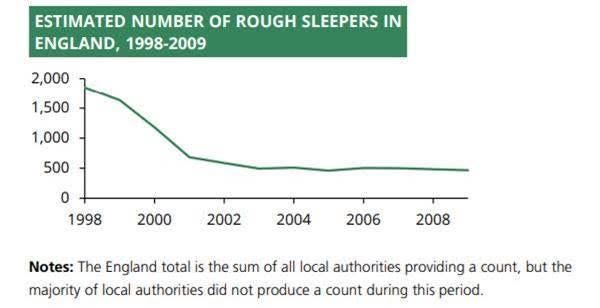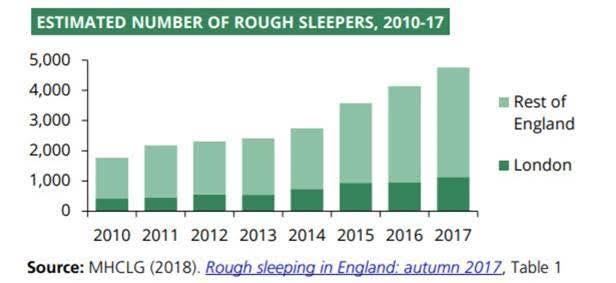If the Tories really want to act on homelessness, they should learn the lessons of New Labour
Theresa May's announcement this week was simply too little, too late

The Conservative government has neglected the issue of homelessness for almost a decade. Theresa May’s announcement yesterday of a £100m fund to end rough sleeping by 2027 is too little and too late.
Even putting aside the embarrassing confusion over how much of the fund is actually new money, the proposals fall well short of what is needed to tackle a problem that continues to blight our country.
Since 2010, the number of rough sleepers in England has risen from 1,800 to 4,800. In London alone, the number has almost trebled – from 400 to 1,100. The proposals put forward yesterday hardly scratch the surface of a problem that has grown dramatically under this government.
This increase in numbers is deeply disturbing, but what makes it worse is that the Conservatives inherited a dramatically improved picture on homelessness from the last Labour government.
Contrary to the lazy and deeply counterproductive caricature of the Blair government as “neoliberal”, homelessness was cut by two-thirds under New Labour – while the number of people sleeping rough fell by three-quarters.

The figures – and those whose lives were transformed – speak for themselves. But as important are the lessons of how this change was brought about.
This impact derived, in my view, from three principles that underpinned much of the domestic policy success of New Labour:
First, setting a clear and ambitious political signal from the centre of government.
Second, a systematic policymaking focus, set through prioritisation within government, with the requisite financial support.
Third, a relentless focus from the centre on implementation and achieving the targets – with regular monitoring and refreshes of policy.
Let me take these in turn.
Tony Blair, as prime minister, announced a major initiative in 1999 to eradicate the “scandal” of homelessness. Beneath that objective, the government had put in place the right policy making apparatus to ensure it was delivered.
The highly effective Louise Casey was appointed head of the Rough Sleepers Unit, which was set up in 1999. In December of that year a major report, Coming in from the Cold, set out the measures to reduce rough sleeping by two-thirds by 2002 – which it achieved.
The government then set out further measures during its time in office – in 2004 and 2008 – as it monitored progress.
Roll forward to 2010 and, on coming into government, the coalition undoubtedly needed to make spending cuts – no major party disputed that at the time, nor does any sensible party disagree now.

What followed, though, was a toxic mix of deep welfare reform and reductions in investment in local services. The 2016 Homelessness Monitor England said: “Two-thirds of local authorities in England reported that 2010-15 welfare reforms had increased homelessness in their area.”
Add to this the lack of a systematic plan to deal with homelessness and you have the perfect storm we have seen over the past eight years, with the levels of rough sleeping in England more than doubled since 2010.
So if, as many agree, the latest government announcements on homelessness are inadequate and not ambitious enough, what should we be doing instead?
First, let’s learn the correct lessons from New Labour’s time in office – in particular, by looking in detail at the methods it used to deliver transformative domestic policy reforms.
Theresa May appears to have belatedly given the issue of homelessness the political priority it deserves. But a policy strategy is now needed, with financial support. This should include looking to reduce the much greater number of people living in temporary accommodation – the main form of homelessness today – and tackling the under-supply of affordable housing to buy or rent.
As Jon Sparkes, chief executive of Crisis, said: “If we’re to end rough sleeping, a bold, housing-led approach to tackling the problem is required, alongside a robust strategy to prevent people from becoming homeless that involves departments from across government.”
Let’s also raise the bar. Some of New Labour’s biggest achievements, on poverty, healthcare and crime, came in areas where ambitious targets were set, and often met. Let’s get every homeless sleeper off our streets sooner, why not by 2022?
Any productive conversation on tackling this issue must start with learning the right lessons on what has worked previously and why today we have another rough sleeping epidemic. That should begin with a long overdue reappraisal of New Labour and its transformative impact on those most in need in our society.
Daniel Sleat is special adviser at the Tony Blair Institute for Global Change
Join our commenting forum
Join thought-provoking conversations, follow other Independent readers and see their replies
Comments